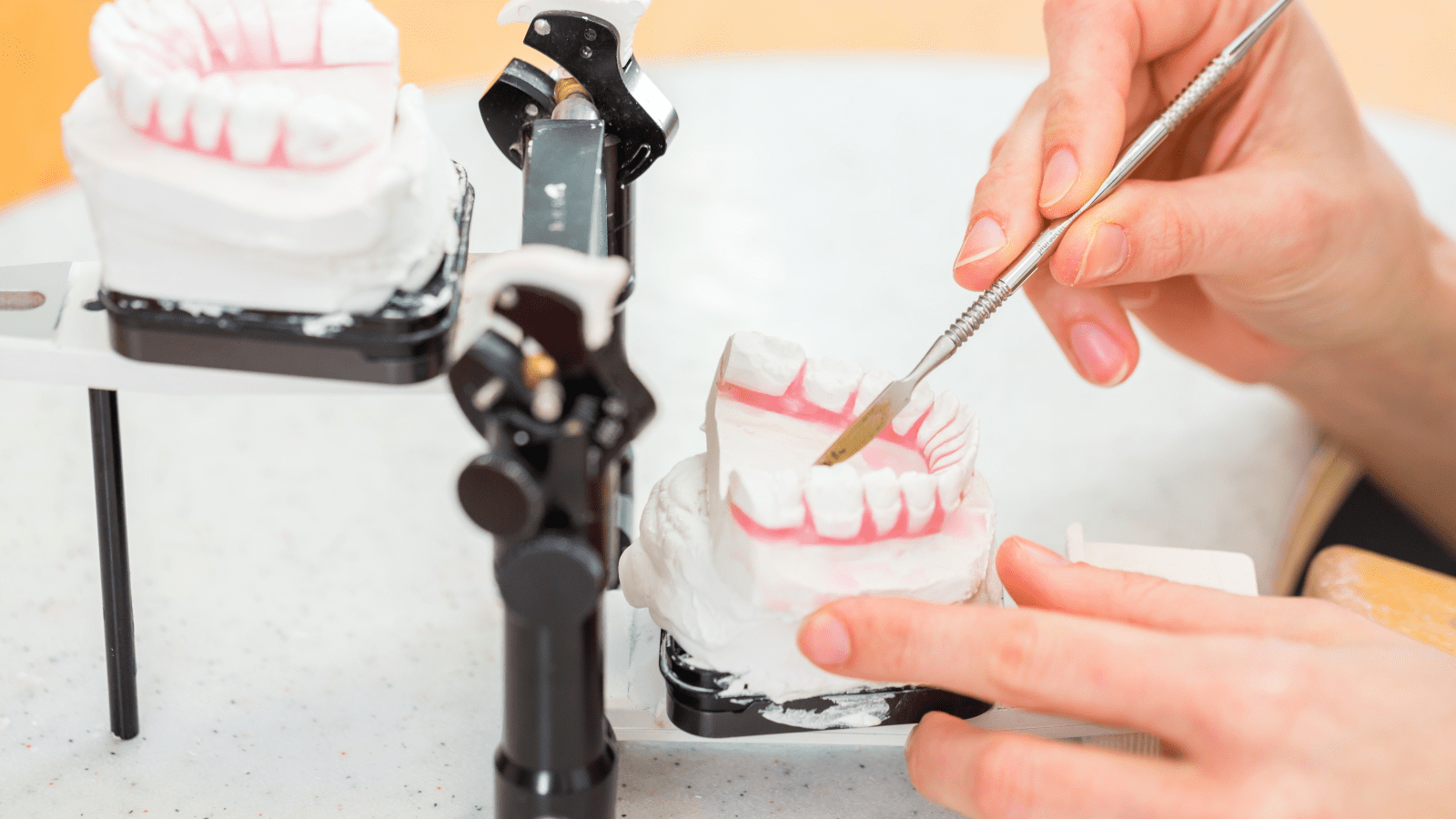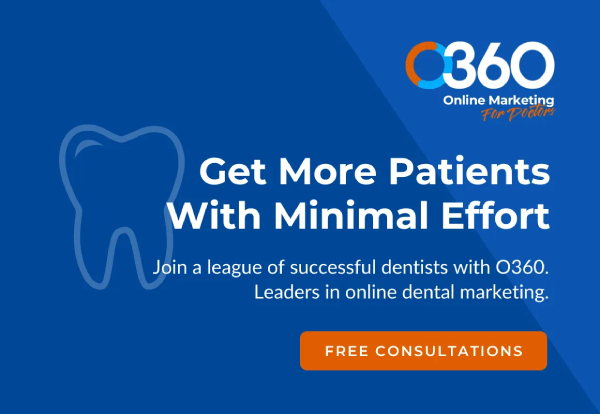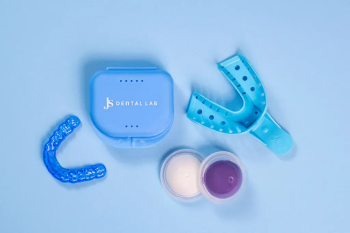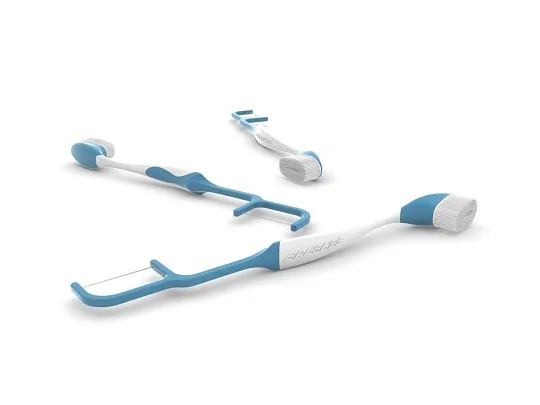How to Choose the Right Permanent Cement for Your Fixed Restorations
Dental cement help to keep the restoration in position for an extended time and help prevent microleakage between the cement material and the tooth. The resistance to solubility, the minimum film thickness, and the amount of friction between the tooth and restoration must be met for it to be considered an adhesive. Adhesives must exert friction on some level, but understanding what makes a dental cement better than others requires understanding its characteristics and how it adheres to the tooth’s surface.
Adhesive cement can adhere and contour to the irregularities of the tooth’s surface, while conventional cement focus on mechanical retention, giving the basic minimum requirements for restoration adhesion. Because the dental cement must act as a barrier to prevent bacteria and fluid build-up, most dental cement will have either an acid-base or a chemical-based reaction, allowing the adhesive to be used as a base for restorations, sealants, and prostheses. To help you choose the most suitable type of dental cement, know that no matter the brand, dental adhesives can be classified according to these specifications:
Zinc Phosphate Cement
As the most used dental cement, it’s an acid-based solution with high strength and low solubility, composed of powder and other liquid that requires regulation of the temperatures of the mixing tiles and immediate application once mixed completely. As time passes, the viscosity of the cement will increase, and thus, it has a high acidity level.
Advantages:
- Easy to manipulate
- Economic in price
- Easily remove excess material
Disadvantages:
- Not aesthetically pleasing
- Susceptible to microfiltration
Zinc Polycarboxylate Cement
Also called polycarboxylate, it has a stronger force strength for traction and compression. Because its liquid component is polyacrylic acid, it has a low pulp sensitivity due to the large molecules formed during its acid-base reaction. Its mixture’s highly flexible, and its chemical makeup reacts to the calcium ions on the surface of the enamel and dentine to adhere greater to the tooth.
Advantages:
- Shorter work time
- Chemically adheres to the dental structure
- Greater solubility
Disadvantages:
- Does not bond with noble metals
- PH of the mixture increases rapidly
- More difficult to remove excess
GET PRICING
Glass Ionomer Cement
Originally used for anterior teeth, glass ionomer cement is considered a conventional cement containing various materials ranging from fluorides and itaconic acid to tartaric acid and alumina. As an acid-base reaction, water, unlike polycarboxylate cement, is required in the setting process. It releases fluorine, which produces greater resistance to bacteria and compression and is translucent in color.
Advantages:
- Aesthetically pleasing
- Chemical stability
- Viscous consistency
Disadvantages:
- High acidic pH
- requires absolute isolation
Resin Cement
Unlike the four types of cement mentioned above, resin cement works as a chemical-based solution, using monomeric acids and filling composed of glass, quartz, silica, and fluoride to neutralize its acidity and, as a result, form a resin that can be used for fillings and restorations. The resin can be mixed manually or automatically and can be made with various shades for translucency.

Advantages:
- Does not cause pupal damage
- High aesthetics
- Good lubricating effects
Disadvantages:
- Decreases resistance when absorbing water
- Susceptible to microfiltration
- Can form air bubbles
Table 1: Comparison of Prices and Ratings for Dental Cements on Amazon*
| Cement Name | Dentaltix Price (€) | Net32 Price ($) | Dentatix Ratings | Net32 Ratings |
|---|---|---|---|---|
| KERR Temp Bond Without Eugenol Zinc Oxide Cement | 19.99 | 29.00 | 5 stars out of 15 reviews | 5 stars out of 25 reviews |
| Dentsply POLY-F Plus Zinc Polycarboxlate Cement | 62.90 | 77.14 | 5 stars out of 1 review | N/A |
| Vitrebond Plus Glass Ionomer Cement | 170.48 | 187.50 | 4 stars out of 2 reviews | 5 stars out of 14 reviews |
| 3M Relyx UNICEM 2 – Automix Resin Cement | 87.09 | 101.50 | 5 stars out of 19 reviews | 5 stars out of 36 reviews |
| 3M Ketac-Cem Glass Ionomer Luting Cement Intro Kit | 59.87 | 94.93 | 5 stars out of 13 reviews | 4 stars out of 28 reviews |
Table 2: Comparison of Features for Dental Cements
| Cement Name | Manufacturer | Suitable for use on | Retentive Properties | Polymerization Inhibition | Eugenol-free | Dispensing format |
|---|---|---|---|---|---|---|
| KERR Temp Bond Without Eugenol Zinc Oxide Cement | Kerr | Crown and bridge | High | No | Yes | Base, Throttle and Mixing Block |
| Dentsply POLY-F Plus Zinc Polycarboxlate Cement | Dentsply | Crowns, bridges, etc. | N/A | N/A | N/A | Powder, water dispenser, measuring tool, mixing block |
| Vitrebond Plus Glass Ionomer Cement | Vitrebond | Anterior and posterior restorations | N/A | Reduces polymerization shrinkage | N/A | Click-to-dispense format |
| 3M Relyx UNICEM 2 – Automix Resin Cement | 3M | Inlays, crowns, bridges, onlays | N/A | No | N/A | Dispensing syringe and multiple tips |
| 3M Ketac-Cem Glass Ionomer Luting Cement Intro Kit | 3M | Post and screw cementation, cavity lining, orthodontic band installment | Optimal fitting | No | N/A | Granulated formula |
Note: N/A stands for Not Applicable, as the information is unavailable for the specific feature.
1. KERR Temp Bond Without Eugenol Zinc Oxide Cement
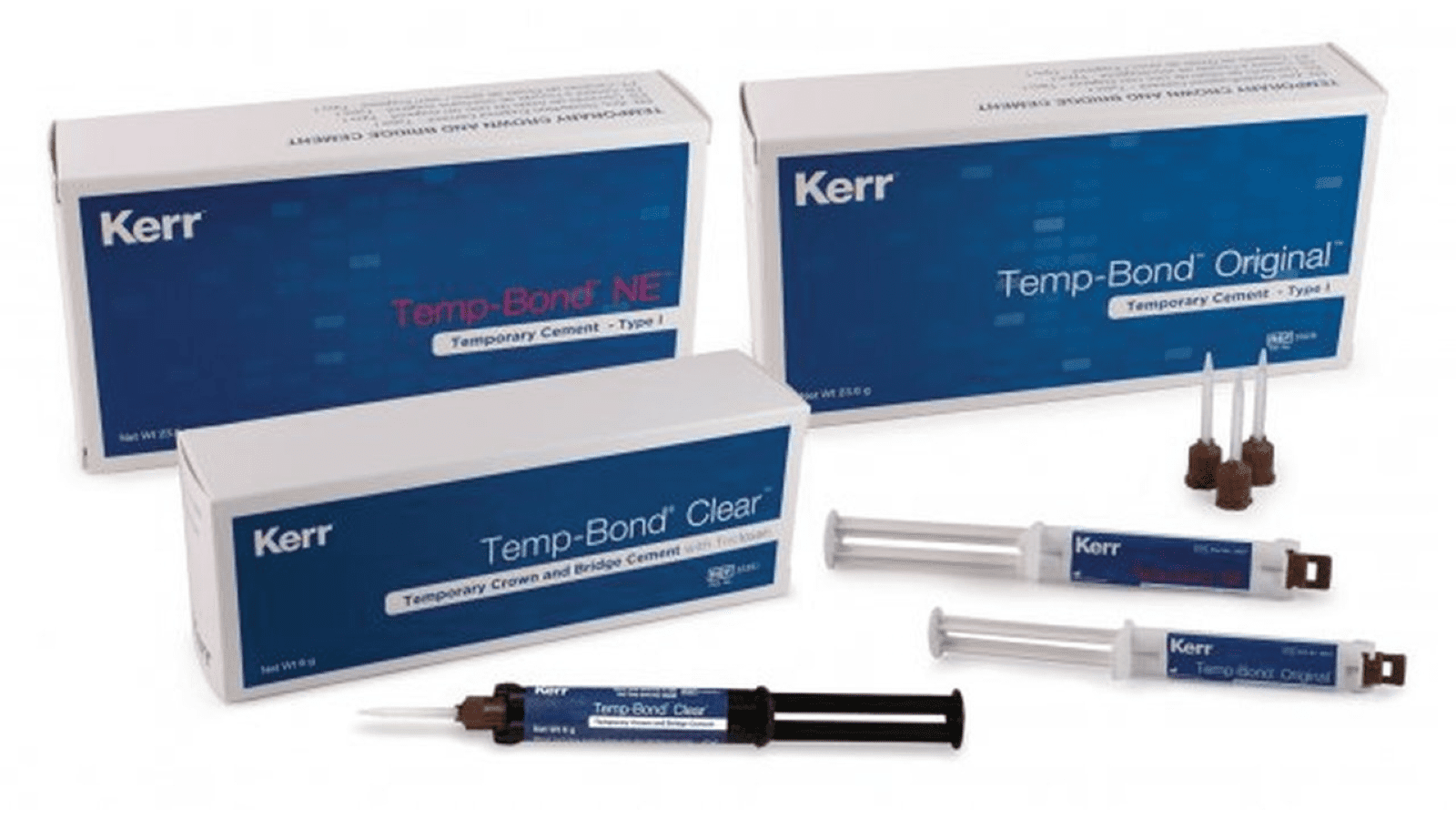
Product Description
KERR Temp Bond Without Eugenol Zinc Oxide Cement is a temporary cement formulated for crown and bridge applications. Designed without eugenol, it provides excellent retention while being compatible with both vital and non-vital teeth.
Product Overview
This non-eugenol zinc oxide cement does not interfere with the polymerization of resin-based materials, making it an ideal choice when bonding temporary restorations before permanent cementation. It is suitable for patients sensitive to eugenol and comes with all necessary components for easy handling and application.
Key Features
- Zinc oxide cement without eugenol
- High retentive strength for crown and bridge procedures
- Will not inhibit polymerization of resin-based materials
- Suitable for vital and pulp-free teeth
- Ideal for patients with eugenol sensitivity
- Includes base tube, throttle tube, and mixing block
Common Applications
- Temporary cementation of crowns and bridges
- Use with resin-based final restorations
- Cases requiring eugenol-free formulations
Technical Specifications
Product Name: KERR Temp Bond Without Eugenol Zinc Oxide Cement
Product Type: Temporary Cement (Zinc Oxide, Eugenol-Free)
Indications: Temporary crown and bridge placement
Formulation: Zinc oxide, no eugenol
Included Components: Base tube, throttle tube, mixing block
Manufacturer: Kerr
Pricing
- Dentaltix: €19.99
- Net32: $29.00
Customer Ratings
Dentaltix: (5/5, based on 15 reviews)
Net32: (5/5, based on 25 reviews)
Customer Feedback
Excellent temporary hold without affecting final cement
Perfect for patients sensitive to eugenol — easy to mix and apply
2. Dentsply POLY-F Plus Zinc Polycarboxylate Cement
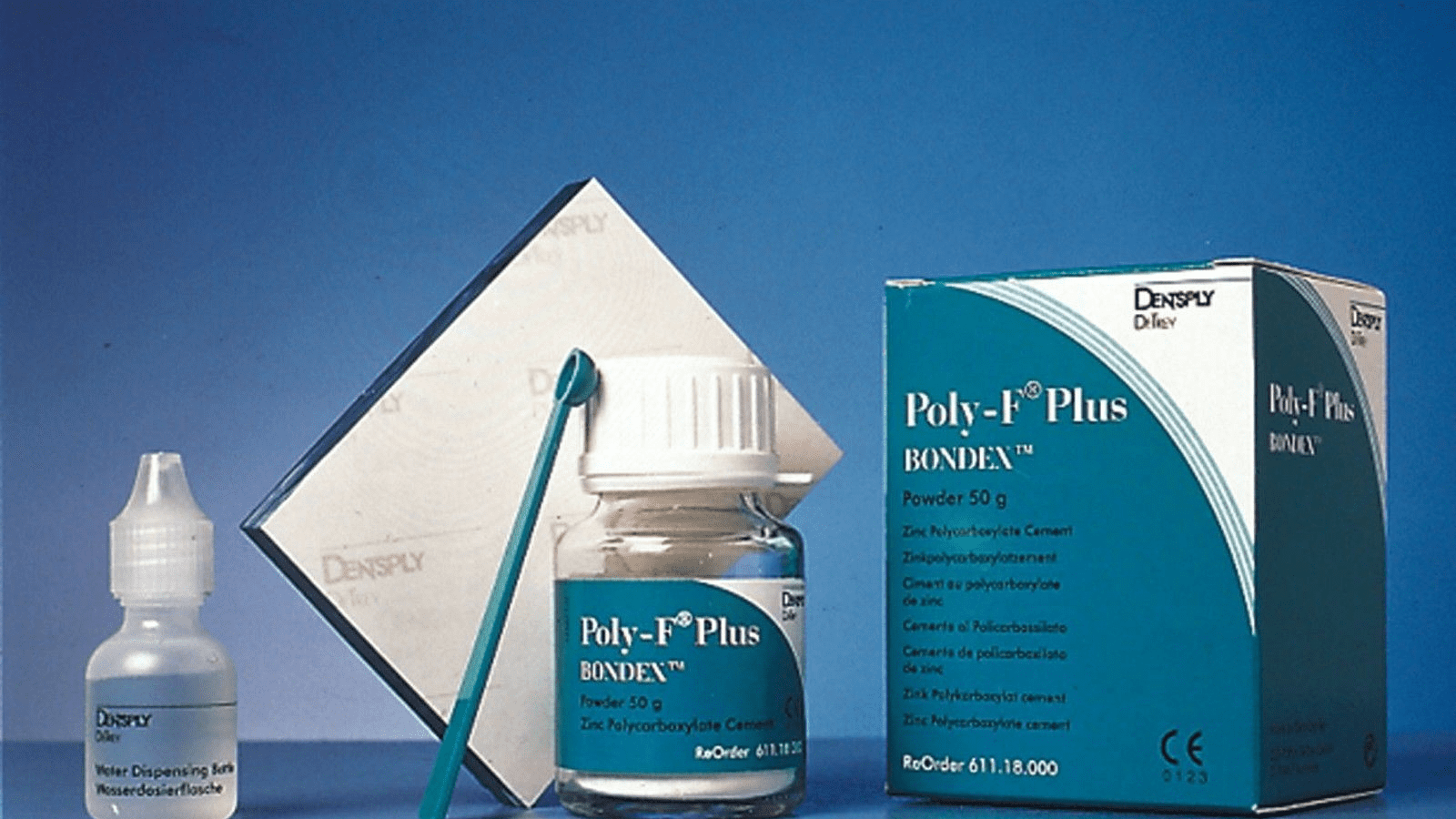
Product Description
Dentsply POLY-F Plus Zinc Polycarboxylate Cement is a versatile, biocompatible material suitable for a variety of restorative procedures, including pulp protection and dentin pre-treatment. Its gentle yet effective formulation provides strong adhesion and pulp-friendly performance.
Product Overview
With a working time of 5 to 7 minutes, POLY-F Plus offers a reliable cementation process for crowns, bridges, root canal treatments, temporary fillings, and cavity coatings. The kit includes everything needed for easy mixing and accurate application, including 50 g of powder, a water dispenser bottle, a mixing block, and a measuring tool.
Key Features
- Zinc polycarboxylate formulation for strong adhesion
- Ideal for dentin pre-treatment and pulp protection
- Consistency setting time: 5–7 minutes
- Versatile use in restorative procedures
- Supplied with powder, water dispenser, mixing block, and measuring tool
Common Applications
- Cementation of crowns and bridges
- Temporary fillings and cavity coatings
- Root canal treatments
- Pulp protection and dentin conditioning
Technical Specifications
Product Name: Dentsply POLY-F Plus Zinc Polycarboxylate Cement
Product Type: Zinc Polycarboxylate Cement
Setting Time: 5–7 minutes
Kit Includes: 50 g powder, water dispenser, mixing block, measuring tool
Manufacturer: Dentsply
Pricing
- Dentaltix: €62.90
- Net32: $77.14
Customer Ratings
Dentaltix: (5/5, based on 1 review)
Customer Feedback
Dependable cement for a wide range of uses
Easy to handle with reliable results — great for pulp-sensitive cases
3. Vitrebond Plus Glass Ionomer Cement
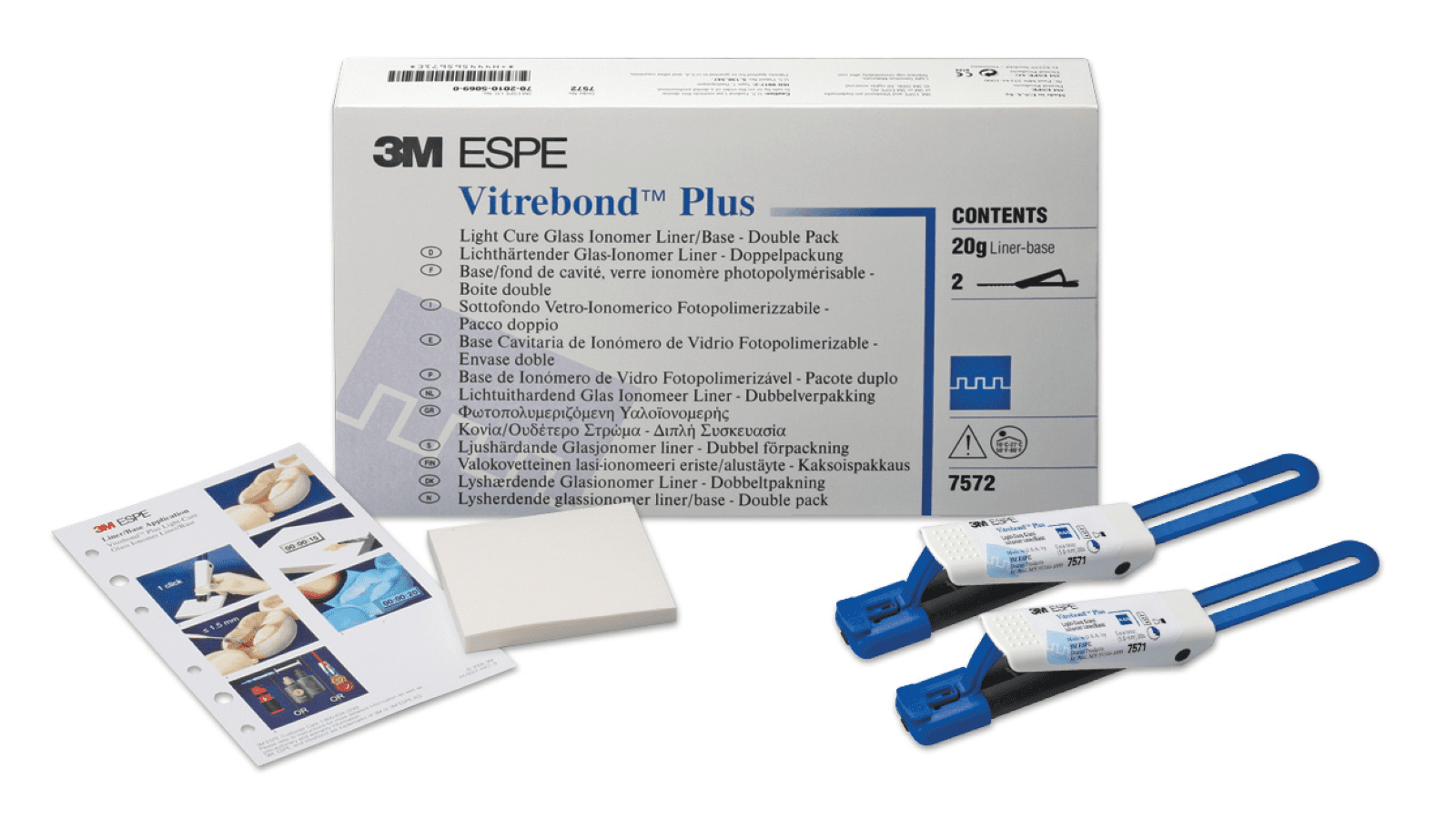
Product Description
Vitrebond Plus Glass Ionomer Cement is a light-cured, resin-modified glass ionomer liner/base designed to simplify placement and enhance patient comfort. Its click-to-dispense system eliminates measuring errors and streamlines application.
Product Overview
Ideal for use under direct restorations in all classes, Vitrebond Plus helps reduce post-operative hypersensitivity and polymerization shrinkage. The kit includes two clicker dispensers, a large mixing block, and a user guide for straightforward implementation into clinical workflows.
Key Features
- Click-to-dispense format for easy, accurate application
- Reduces hypersensitivity and polymerization shrinkage
- Suitable for all classes of direct restorations
- Resin-modified glass ionomer formulation
- Minimizes technique sensitivity during placement
- Includes user guide for step-by-step instructions
Common Applications
- Base or liner under Class I–V direct restorations
- Reduction of hypersensitivity in deep cavities
- Placement beneath composite or amalgam restorations
Technical Specifications
Product Name: Vitrebond Plus Glass Ionomer Cement
Product Type: Resin-Modified Glass Ionomer Cement
Dispensing System: Clicker dispenser
Includes: 2 dispensers, large mixing block, user guide
Manufacturer: 3M
Pricing
- Dentaltix: €170.48
- Net32: $187.50
Customer Ratings
Dentaltix: Based on 2 reviews
Net32: Based on 14 reviews
Customer Feedback
Efficient dispensing system with minimal waste
Great handling properties and reliable patient comfort

4. 3M Relyx UNICEM 2 – Automix Resin Cement
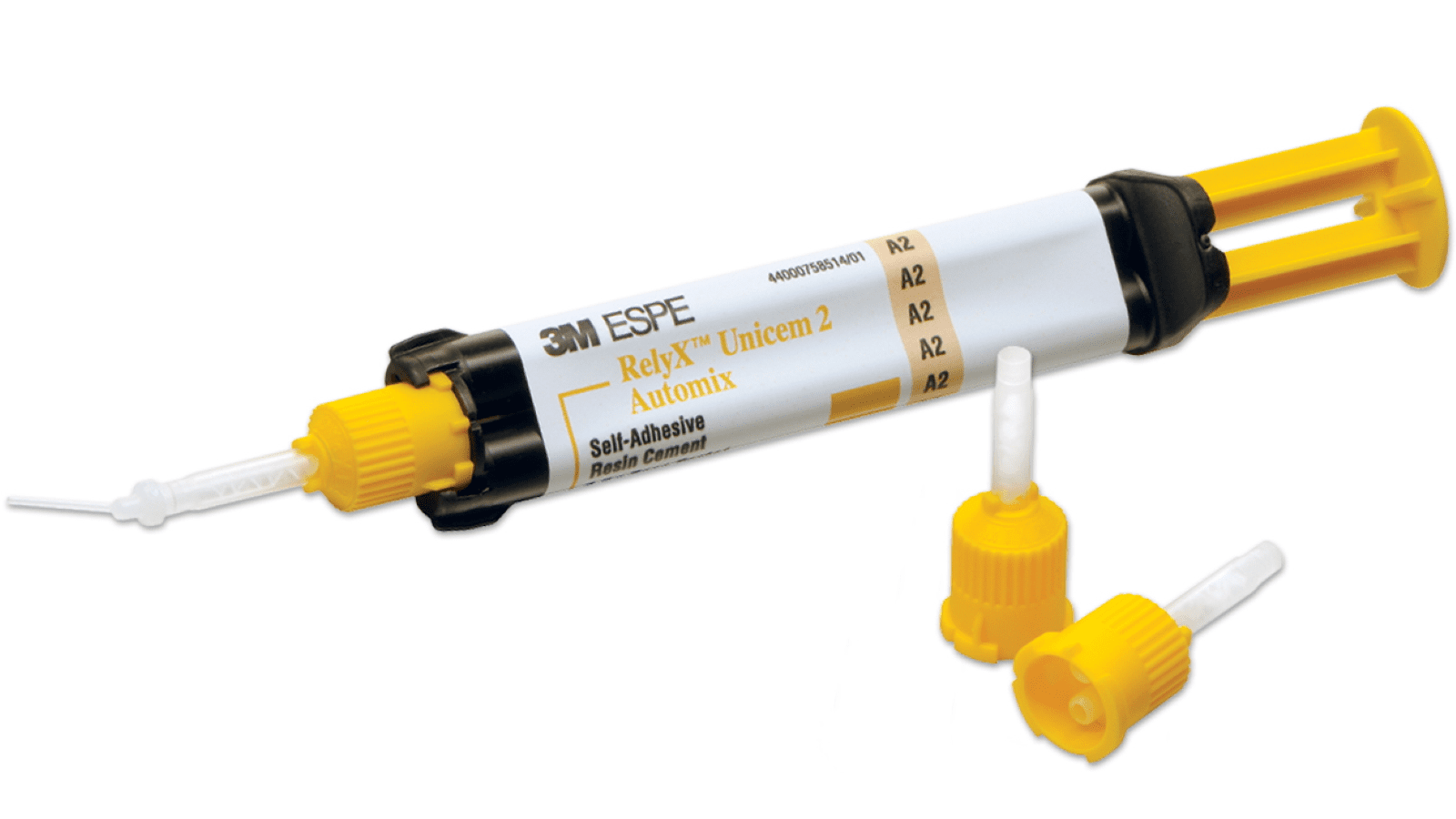
Product Description
3M Relyx UNICEM 2 Automix Resin Cement is a self-adhesive, dual-cure resin cement offered in a convenient automix syringe format. It delivers strong, reliable adhesion without the need for separate primers or bonding agents, streamlining cementation procedures.
Product Overview
Known for its ease of use and clinical versatility, Relyx UNICEM 2 adheres to a wide range of materials and resists color fading over time. The automix system allows for quick, consistent application with minimal risk of bubbles, making it ideal for fast-paced practices. The kit includes a dispensing syringe and multiple tips for various clinical needs.
Key Features
- Automix syringe for easy, precise dispensing
- No pre-treatment or bonding agents required
- Strong adhesion to all dental surfaces
- Low risk of bubble formation
- High color stability and esthetics over time
- Suitable for a wide range of indirect restorations
Common Applications
- Cementation of crowns and bridges
- Placement of inlays and onlays
- Use in cases requiring fast, reliable resin bonding
Technical Specifications
Product Name: 3M Relyx UNICEM 2 – Automix Resin Cement
Product Type: Self-Adhesive Resin Cement
Curing Type: Dual-cure
Delivery System: Automix syringe
Includes: Syringe and multiple mixing tips
Manufacturer: 3M
Pricing
- Dentaltix: $87.09
- Net32: $101.50
Customer Ratings
Dentaltix: Based on 19 reviews
Net32: Based on 36 reviews
Customer Feedback
Quick and reliable with excellent esthetics
Our go-to cement for crowns and onlays — very easy to use
5. 3M Ketac-Cem Glass Ionomer Luting Cement Intro Kit
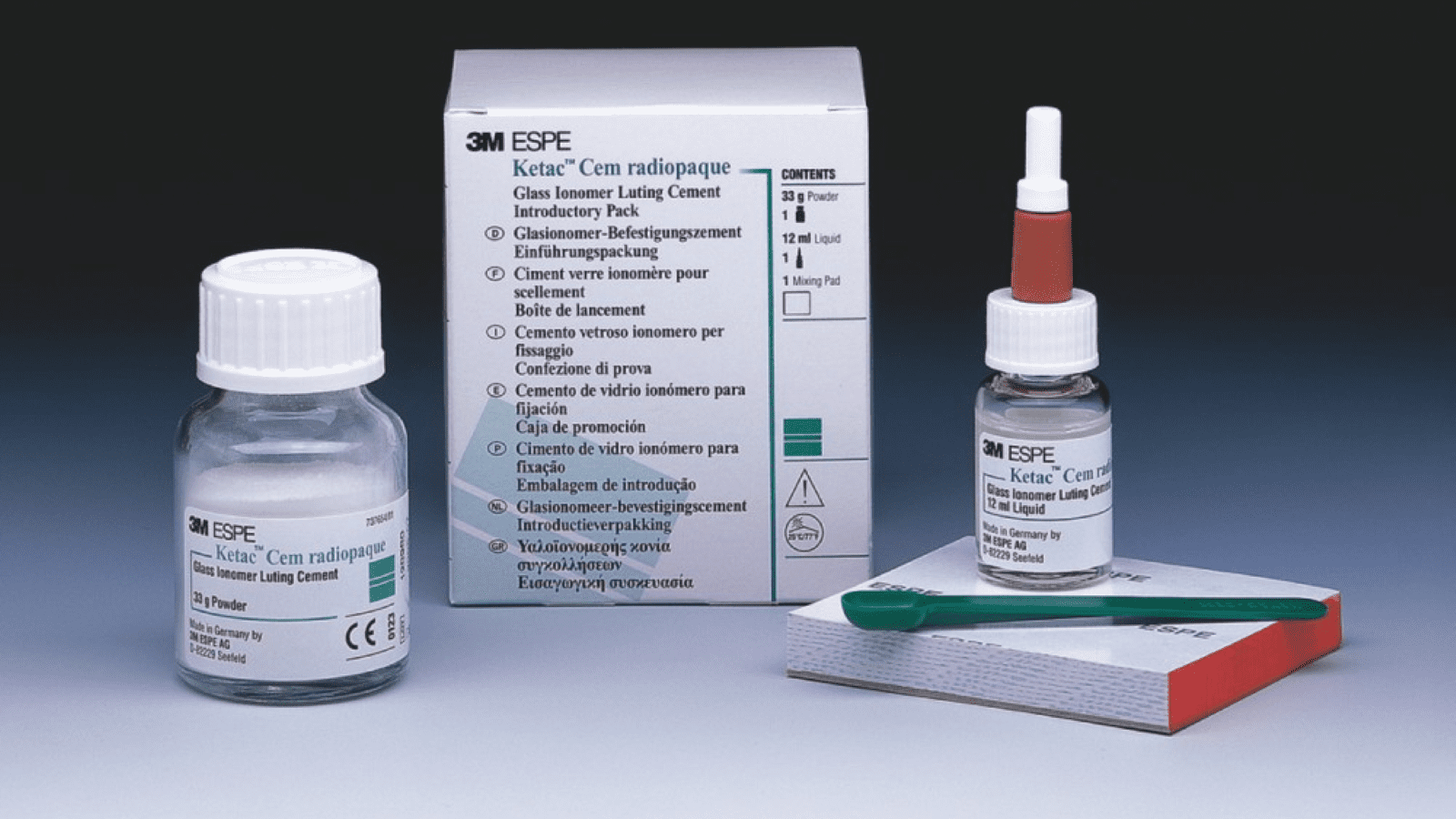
Product Description
3M Ketac-Cem Glass Ionomer Luting Cement Intro Kit is a versatile, fluoride-releasing luting material designed for precise and reliable cementation. Its granulated formula ensures easy mixing and reduced waste, making it a practical option for restorative and orthodontic procedures.
Product Overview
This glass ionomer cement delivers strong adhesion to enamel and dentin, reducing microleakage while offering excellent biocompatibility. With a thin film and high radiopacity, it’s ideal for procedures requiring precision and visibility. It is commonly used for post and screw cementation, cavity lining, and orthodontic band placement.
Key Features
- Granulated formula for fast, consistent mixing
- Thin film for accurate seating and fit
- Fluoride-releasing to support enamel protection
- Bonds immediately to enamel and dentin
- High radiopacity for easy identification on radiographs
- Biocompatible for use in endodontic and orthodontic applications
Common Applications
- Cementation of posts and screws
- Lining cavities before permanent restorations
- Cementing orthodontic bands
- General luting procedures in restorative and surgical dentistry
Technical Specifications
Product Name: 3M Ketac-Cem Glass Ionomer Luting Cement Intro Kit
Product Type: Glass Ionomer Luting Cement
Formulation: Granulated for easy mixing
Film Thickness: Extremely low
Fluoride Release: Yes
Radiopacity: High
Manufacturer: 3M
Pricing
- Dentaltix: €59.87
- Net32: $94.93
Customer Ratings
Dentaltix: Based on 13 reviews
Net32: Based on 28 reviews
Customer Feedback
Easy to mix and apply — great fit with minimal microleakage
Reliable fluoride protection and excellent handling
Cement selection for your practice matters because the quality of your products produces the quality of your services. Easy-to-use cement and accessories help form strong, reliable bonds with your patient’s teeth, and cement that reduces sensitivity and has excellent aesthetics will give any indirect or direct restoration procedure the boost it needs to be successful. Our recommendations include Kerr’s Tempbond cement for accommodating those sensitive to eugenol and 3M’s UNICEM 2 for its easy prep time. For glass ionomers, the Ketac-cem provides an optimal fitting for restorations without sacrificing time during procedures.
